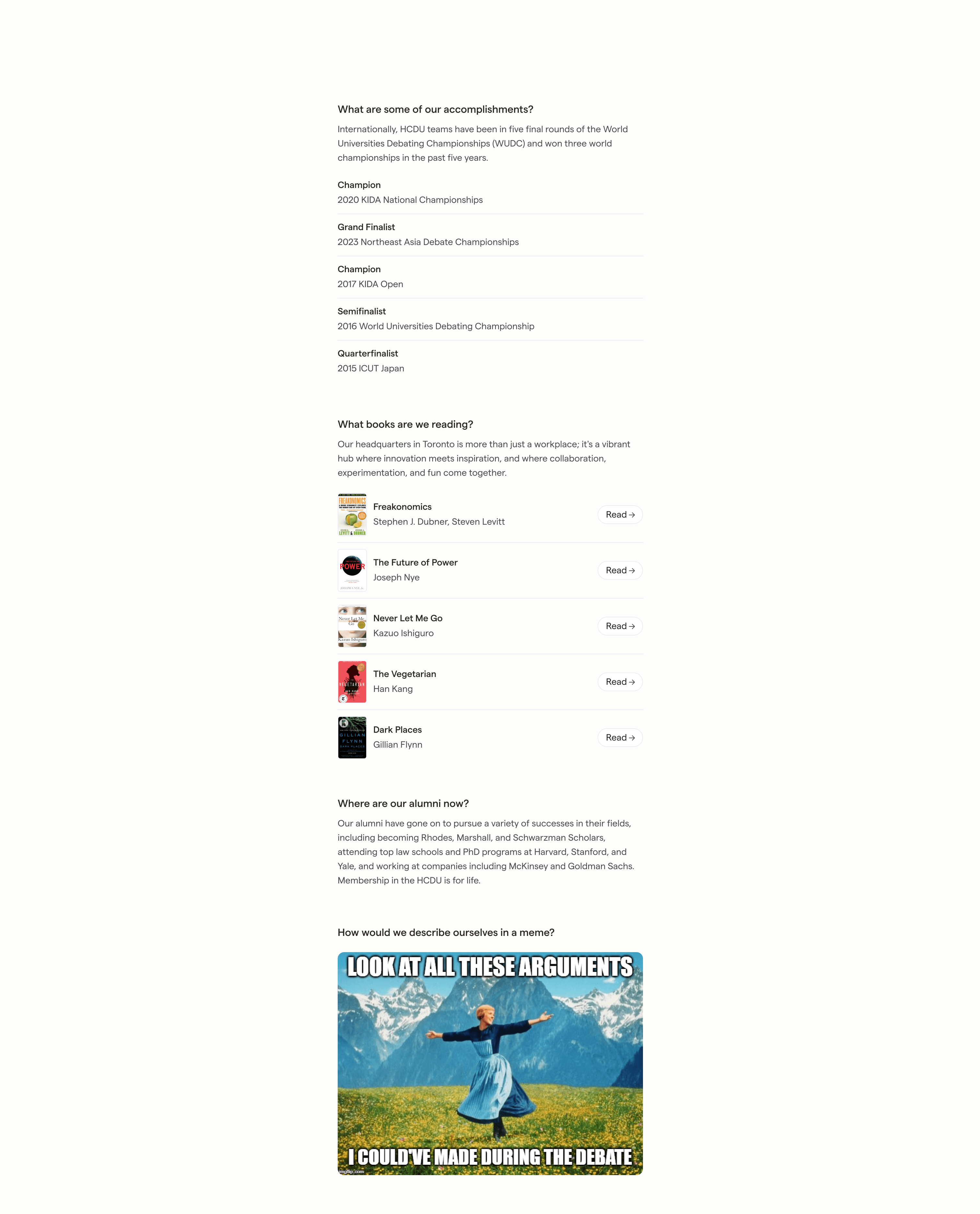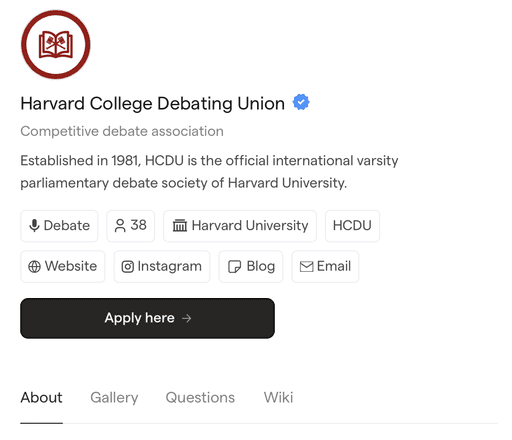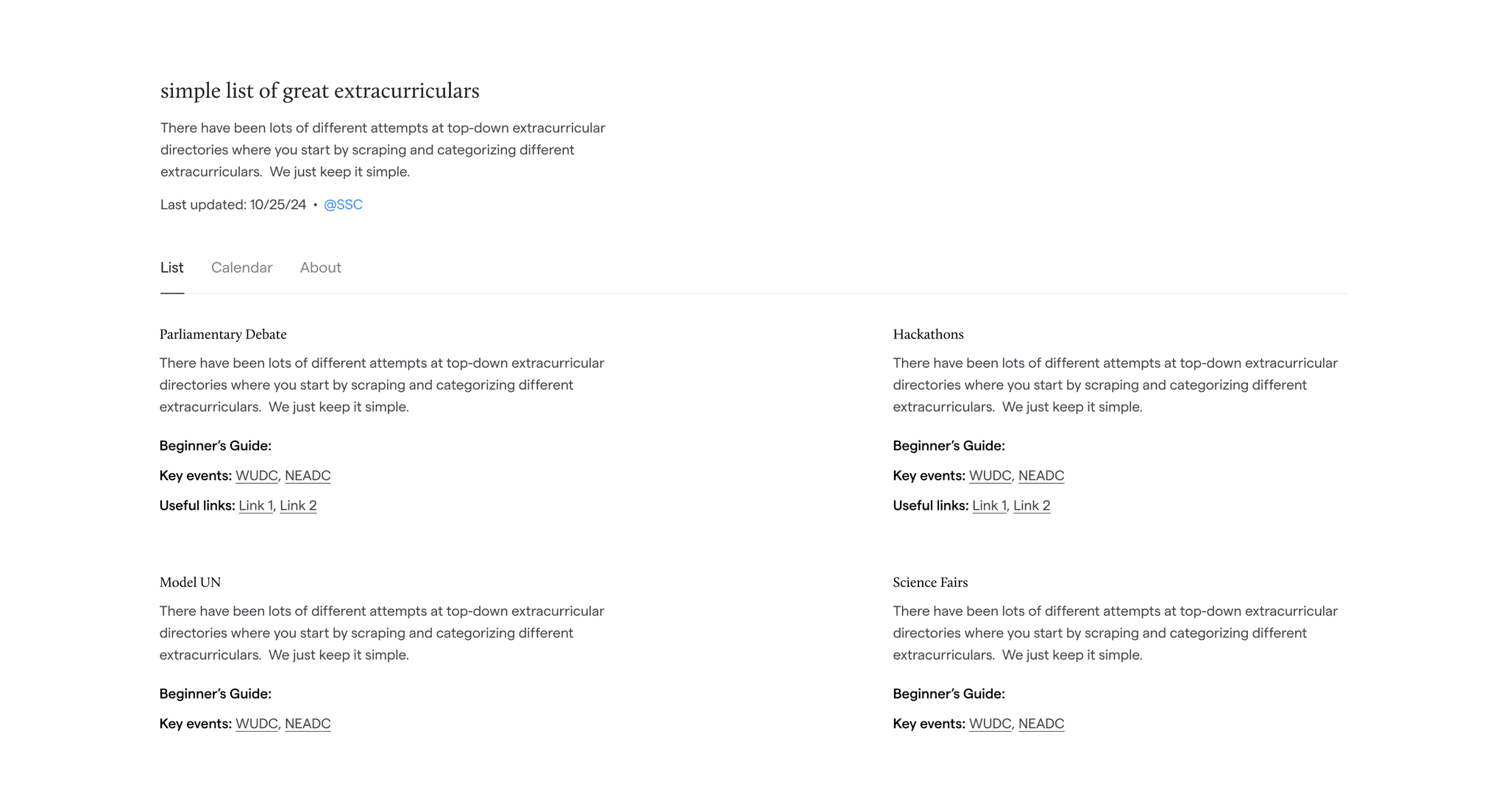SSC Product Roadmap
An internal memo on growth and how we should navigate the ambiguous scaling prospects of edtech
November 6, 2024
Students are generally not accustomed to downloading software for educational purposes, let alone purchasing software. This is the mountain we need to overcome.
I think we're already in the right direction, whereby we focus on free, frictionless experiences that are not dependent on user authentication. The question we need to ask ourselves then is how do we smoothly onboard student communities, replace existing extracurricular infrastructure, but more crucially, convince students and event organizers that infrastructure is something worth replacing.
The TLDR hypothesis of this memo: we need to conduct targeted experiments on extracurricular categories like debate and hackathons to assess the type of software students genuinely need, whether that be centralized calendars, unified libraries for resources, custom "blocks", site-builders, event page archiving, etc.
In this memo, I want to bring up 8 important points and updates that hopefully everyone takes note of. It's a long read, so do bear with me.
1) Dongari Site Builder
At the moment, I am about 80% done with building a site-building system, embedded with sufficient automations and manipulatable components that shorten the site-building process to about 10 mins. You can click here to see a still incomplete demo profile site for the Harvard College Debating Union. It has some basic components on there as well as a fun custom OG image that comes with the sublink (haksaeng.co/hcdu), so you can look through it for first impressions.
Of course, the internal tool interface is not public-facing so users can only send data to us via a third party form, but not actually actively replace and modify data independently themselves. We have to do the site-building for them. Here's a short loom explaining the general in-house system.
I don't see this as a huge issue in the closed beta, but as we scale and onboard more clubs (or more accurately IF we want to scale and onboard clubs), we need to setup a native site-building interface.
2) Custom "blocks"
While a lot of the information presented on each Dongari site will predominantly be text or image based, the goal is to make specific software for specific clubs. And since our site-builder interface is built through ordered questions prompts (reference read.cv team profile building process) or "blocks", this is a chance for us to create simple widget-like components that specifically cater to certain types of clubs.
So I think we can all spend some time (especially would love to hear from Chaeyoung hehe) conceptualizing different concept prototypes for such blocks. For example, a tech stack block for programming clubs that allows them to list the programming languages they work with, a block to list the club's notable Github repos, or even embedding a Github Contribution Graph. For book clubs, we can create a block for the list of books they're reading. For gaming clubs, we can create a block for them to list the games they play or for them to add team stats like average KDA whatnot. For music clubs, we can create a concert ticketing block. For sports teams, a player roster block. For cooking clubs, a block listing recent recipes. Seriously, the applications are endless.
I think a general guideline to follow when creating prototypes for blocks would be: 1) They need to be based on question prompts like: "What books are we reading?", or "What games are we playing?", and 2) They need to be technically simple with the complexity of a basic CRUD app: simple listing and linking basically, especially during the closed beta stage where we can't do API embeds. The goal is to essentially create a comprehensive library of custom blocks so that during the site-building process, clubs can choose a club category (for example, programming, cooking, newspaper), and then we suggest specific blocks for them to add to their site based on the category they chose.
But more importantly, we need to ideate some simple custom block prototypes for debate clubs (like speaker tabs, recent motions list, accomplishments, etc), especially if we are going to proceed with an "Extracurricular Track". I explain what this means below.
3) The Campus Track
Effectively see two Tracks of growth for Dongari: The Campus Track (The Facebook way) and The Extracurricular Track (Network effect). Our current approach is the campus track, building club directories or virtual club fairs at each campus, starting with Yonsei and then onboarding into other campuses in order. This is the way Facebook first scaled (if you'd like to learn more about Facebook's strategy, I highly recommend listen to the podcast "Acquired" and its recent episode doing a deep dive on Meta), by opening up closed networks in each campus in order, and receiving waitlist registrations from campuses where the network was not open yet. Now, I definitely do think we should do a closed beta at Yonsei at some point because:
It’ll be good practice for us to release on a campus directly, especially on the UI and product front.
Tom has graciously scraped most of the data required for a campus launch.
Eventually, the campus track is the goal because we want to become the go-to interface for club directories, replacing existing rusty enterprise solutions like Anthology and CampusGroups.
But, I foresee one particular problem in our ability to effectively scale under the Campus Track: there is no natural network effect. And without this network effect, there is no inherent reason for clubs to opt in to building sites in the first place.
While I do believe that offering clubs a free website is a great incentive, the incentive is conceptually self-contained. Users will have a hard time appreciating the output or net utility gained from a site-builder. Because while we can explain to clubs that there are benefits to having a site (free link-in-bio, free SEO indexing, great outreach tool for freshmen, clearer information wiki of club), the fact that we have to explain these incentives is already a hurdle in of itself.
Plus, there’s no particular reason for many top-performing clubs (like GMT) to make a site, because while yes it won’t take long to build one, they just don’t see an obvious benefit (no clear immediate convertible benefit for them because they already have reliable base of applicants) and might see the transition to a Dongari site as a needless investment of time.
Thus, we need to position ourselves as an active resource rather than a product. Something that student communities perceive to be actively helpful or educational. Because while I do think websites are helpful, they are essentially the delivery method, rather than the resource itself.
But also crucially, if we target campuses first, we're risking interacting with incredibly unpredictable variables. With diverse club and event types, that means that we'll always have to pit the priorities of one type of club (consulting vs programming club) or one type of event (music concert vs conference) with the other, so there would be too much varying feedback loops to engage with as well as too many forms of custom software to build.
4) The Extracurricular Track
The alternative is to target specific extracurricular categories and scale from there. By extracurricular categories, I mean fields like debate, hackathons, science fairs, book clubs, sports varsity teams, gaming clubs, student newspapers, etc. Of these fields, I think we should target the debate category first by launching our first closed beta for global debate societies and competitions (like KNC, NEADC, Australs, WUDC, etc).
But why debate? The debate community is a much more controlled, predictable, and friendly environment for us to experiment and grow in as compared to campuses. There are several reasons why:
We know exactly what events are being organized, so it’ll be easier for us to sync competition event schedules into one central calendar, especially in the closed beta stage when we have a closed feedback loop and users can’t independently generate profiles and we have to do things manually. This will drive organic recurring traffic.
We can populate the platform with actually useful data, for example pre-populated with key event profiles (World Championships, Asian Championships, Australs, etc), resources, and more.
We know exactly who to partner with and contact (KIDA, EduDrift, WUDC Council).
We get an initial foothold on campuses across the world (USA, Japan, Singapore, Philippines, UK, etc).
There’s an inherent network effect benefit shared by the 10s of thousands of global parliamentary debaters, because as more debaters join, more community resources and events will be shared, debate societies can contact each other, there is more central transparency regarding events, each new debate society added benefits each other. If you compare that to the Campus Track, there is no network effect because for example, a Yonsei club does not immediately get a benefit from another Yonsei club site being created, or for that matter, a KU club site being created.
There is a community we can directly assist and interact with by helping arrange joint sessions, organizing resources and links, hosting workshops, getting user feedback and creating custom software for.
The hope is that there is a category FOMO effect. For example, while a club like GMT might not see a huge incentive in creating a Dongari site just because other Yonsei societies are doing it, they would be naturally encouraged to create a site if other consulting societies around the world, like Harvard and LSE were starting to use it.
From these experiences and experiments, we can be more informed when expanding to other fields like programming (hackathons), MUN, gaming, book clubs, science fair, consulting, student newspapers, chess clubs, etc.
To be clear, we would be targeting the parliamentary debate community first. There are 10s of thousands of other debaters in other debate forms (Public forum, NSDA, etc).
The Extracurricular Track will also benefit the Campus Track,
The goal is for a Dongari site to be seen as a “category standard”, rather than a “campus standard”, at least in the beginning.
Why the debate community first? Because this is the community we are familiar with the most. Not only in sentimental and interpersonal terms, but also in quantifiable terms: we know exactly what events, key actors, resources to aggregate, societies to contact. That means we also have a clear list of targets for an initial private beta: the 11 KIDA societies as well as a few more handpicked clubs that we have existing relationships with (NUS, NTU, University of Tokyo, Ateneo, etc).
So how should we run our closed betas? We should first run a private beta of 20~30 clubs, and then run a closed beta opening up sites for debate societies and events across the world. We should think of this as an experiment on edtech growth strategies, comparing the Campus Track vs the Extracurricular Track. We can document the findings and data, and write a paper of our experience.
I also don’t think the Tracks necessarily mutually exclude each other. We can reasonably grow through both tracks. The question is then, which one first? I think doing the extracurricular track first allows us to build up some legitimacy, and be seen as a trustworthy platform by Yonsei clubs, so that when we do end up doing the Campus Track, we'll have a much more comfortable time.
5) Dongari Site: Ideas for "Questions" and "Wiki" tabs
I'm facing a little a bit of a creative block at the moment. While prototyping the club profile sites is going relatively smoothly, I'm finding it hard to think of the best ways to use the "Questions" and "Wiki" tabs.
For the Questions tab: I'm pondering whether to use the Questions tab as a FAQ section, or to add some of more personal prompts like ("What music do you listen to?") on there.
For the Wiki tab: I think an initial idea that I have is to add in certain extracurricular category relevant information on there. For example, simple explainer text that explains what parliamentary debate is and such, so that every Dongari site for parliamentary debate clubs automatically comes with educational information that clubs can choose to embed onto their site.
Would love help ideating some stuff for these tabs!
6) simple list of great extracurriculars
One of our biggest weaknesses at this point is that we don't have any convertible metrics to showcase. I've already mentioned this idea before, but we're just going to list out some big extracurricular events and curate a few relevant resources and links so that students can get quick overview of what extracurricular competitions are out there in the world. This is still a prototype, but hopefully this quick screenshot will give you an idea of the type of direction I'm taking for this small project. This project would be run either before our closed beta launch, so that we can drive initial traffic to the site.
I would need some help curating resources for certain categories. For example, if I assign you to "Hackathons", I would ask you to write up a basic introductory paragraph of the extracurricular, and add links to important events and web resources/guides/tutorials about said extracurricular.
7) Celebrating student accomplishment (digital magazine, vlogs, changelogs, research papers, and other mediums)
Yoonseo mentioned how she enjoys storytelling, and I completely agree with this sentiment. Here I'll just list out some basic marketing ideas I've had that encompasses our mission:
A newsletter or digital magazine that highlights "extracurricular heroes", heroes meaning winners of prominent extracurricular competitions (Intel ISEF, Google Hackathons, WUDC, ABP, student film festivals, etc) or outstanding individual achievements by students (like student journalists or startups etc). We would ideally interview these individuals on a yearly basis and ask them about their thoughts and any tips they might have for any student looking to participate in the same extracurricular event. I think tagline for this project would be: "We want to celebrate student writers, student scientists, student artists, student programmers, student musicians, student journalists, student debaters, student everything and everyone."
A changelog that announces key updates on our betas.
A web blog and vlog series inspired by Arc that will document our journey building SSC and launching our closed betas - all the up and downs. The vlog series can also draw inspiration from dev log series from ChefRPG.
A research arm within SSC that does market research on edtech, as well as product analysis and crits of competing softwares. Inspired by the approach of Contrary. I think for this research to be meaningful, they need to be highly technical and scientific, not casual, written with deep understanding of HCI, UI trends and statistical tools. Good reference point would be research paper written by MIT Media Lab. Potentially, we can create a similar fellowship program like Contrary, where we invite students from schools in Korea to research private markets and startups in Korea.
Also, just as a side note, but Hannah Lee is going to be sharing the vectorized header illustration soon and I'll be reaching out to her about using her retro Mac icon illustration as our logo! So once we have that essential piece of brand identity, I think we can slowly think about doing a soft launch across different platforms (read.cv, Twitter, LinkedIn, 1517 Discord, and other mediums). We can time the soft launch to match with the date of our 1517 Event.
8) 1517 Fund x SSC Event
We still have to finalize details about this event, But the initial idea is to host something on the afternoon of 11/22. Would appreciate suggestions for venue that can accommodate 45+ people and that is close to a boba/ice cream place. We also need help translating and printing out the Prologue of the Michael Gibson's book "Paper Belt on Fire" and someone to design promo material for the event like the 공고 poster and 글 to share on select chatrooms and channels. I think our target audience would mostly be student club leaders as well as student programmers. More details will follow.


